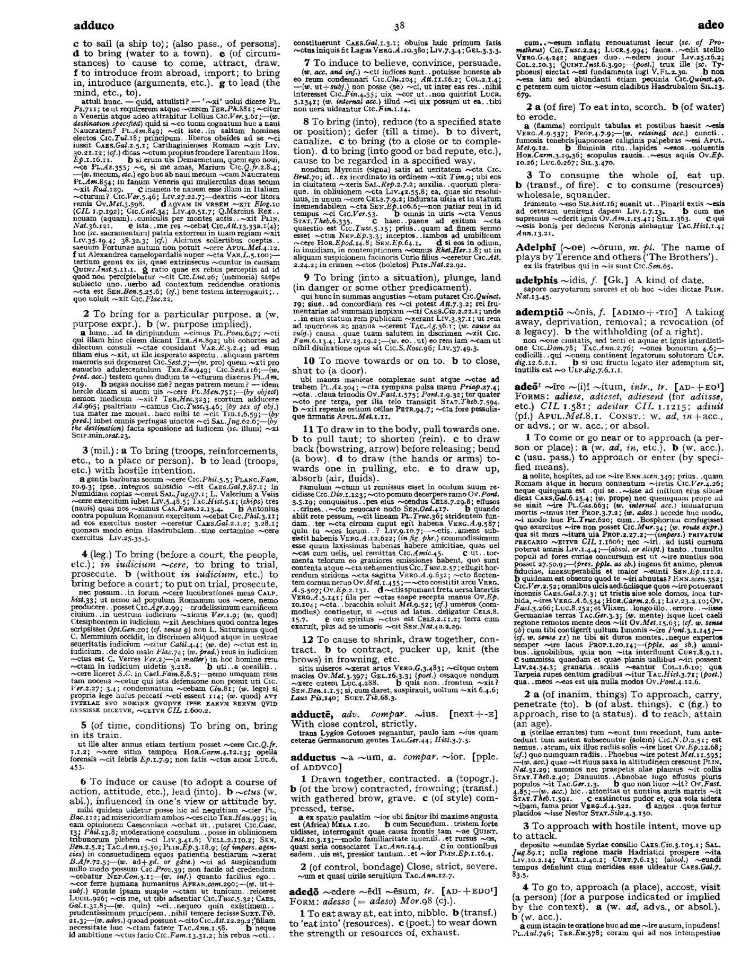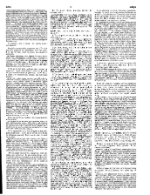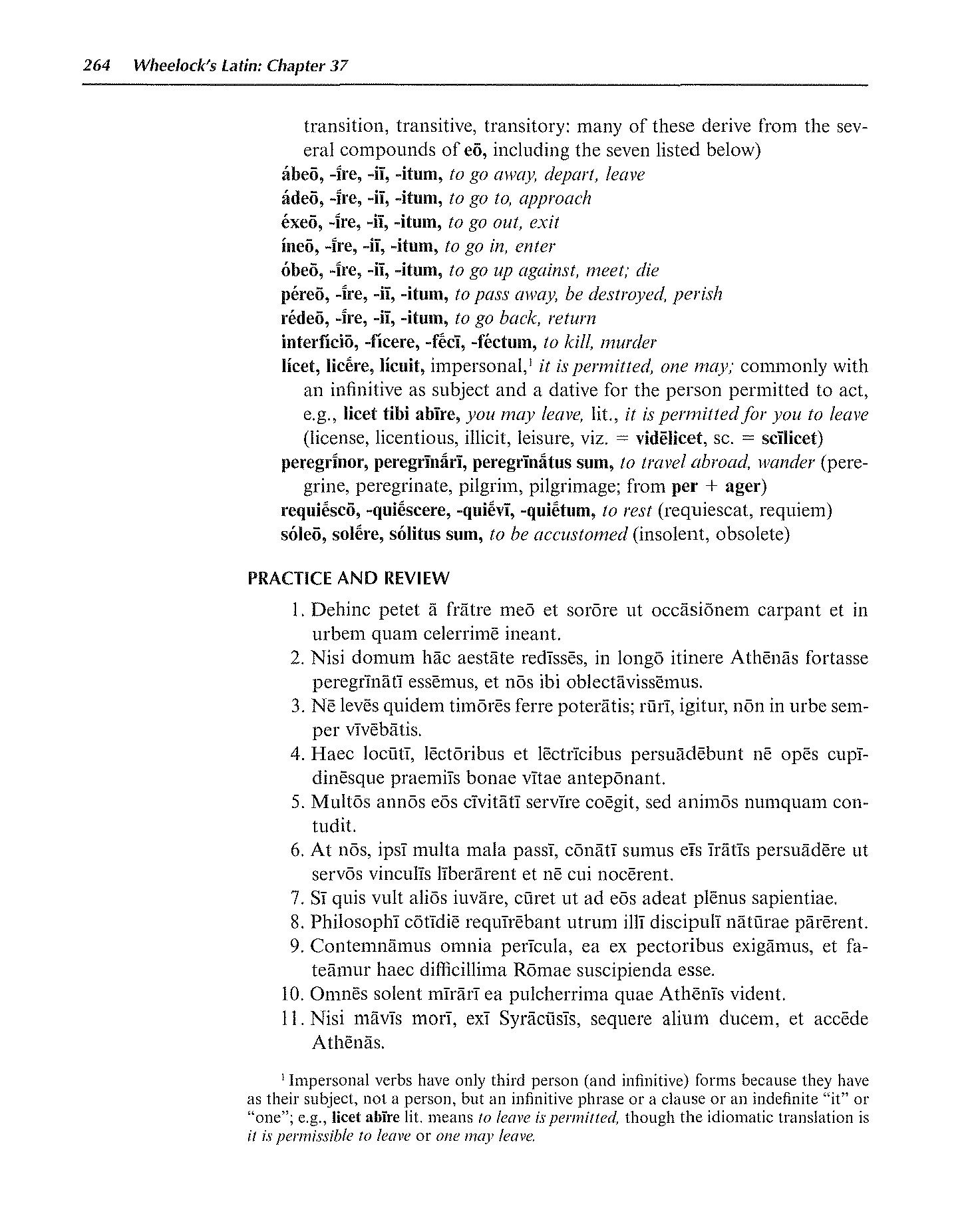
page_listing.tpl
page_subListingDetails.tpl
sub_listingDetails_style1.tpl
sub_listingDetails.title.tpl
adīre to go to
adīre is a Latin Verb that primarily means to go to.
Definitions for adīre
Wheelock's Latin
Verb
- 1
to go to, approach
Oxford Latin Dictionary
Verb
- 1
To come or go near or to approach (a person or place): (a) (w. ad, in, etc.). (b) (w. acc). (c) (usu. pass.) to approach or enter (by specified means).
- 2
(a) (of inanim. things) To approach, carry, penetrate (to). (b) (of abst. things). (c) (fig.) to approach, rise to (a status). (d) to reach, attain (an age).
- 3
To approach with hostile intent, move up to attack.
- 4
To go to, approach (a place), accost, visit (a person) (for a purpose indicated or implied by the context). (a) (w. ad, advs., or absol.). (b) (w. acc.).
- 5
manum ~ire (+dat.). To cheat, hoax: see MANVS1.
Sentences with adīre
Latin to English
Imperāvit tribus mīlitibus ut pācem petītum Rōmam adīrentCompare He ordered the three soldiers to go to Rome to seek peace.
Senātorēs quīdam Caesarī adeō invidēbant ut eum occīderint.Compare Some senators hated Caesar so much that they killed him.
Principibus placuisse viris non ultima laus est. non cuivis homini contigit adire Corinthum.Compare To have found favor with leaders of mankind is not the meanest of glories, It is not everyone that can get to Corinth.
Ut nunc sunt mores, adeo res redit: si quis quid reddit, magna habendast grata.Compare The way things are today, you have to act very grateful when someone pays back what he owes you.
Urbem excoluit adeō ut iūre sit glōriātus marmoream sē relinquere quam latericiam accēpisset. (Said of Augustus, Suetonius, Augustus XXVIII.3)Compare He improved Rome to such an extent that he could rightly boast of having found it brick and left it marble.
Conjugation table for adīre
Cactus2000
| ACTIVE | |
| Indicative present | Indicative imperfect |
| adeō adīs adit adīmus adītis adeunt | adībam adībās adībat adībāmus adībātis adībant |
| Indicative perfect | Indicative pluperfect |
| adiī / adīvī adīstī / adīvistī adiit / adīvit adiimus adīstis adiērunt / adēre | adieram adierās adierat adierāmus adierātis adierant |
| Indicative future | Indicative future perfect |
| adībō adībis adībit adībimus adībitis adībunt | adierō adieris adierit adierimus adieritis adierint |
| Subjunctive present | Subjunctive imperfect |
| adeam adeās adeat adeāmus adeātis adeant | adīrem adīrēs adīret adīrēmus adīrētis adīrent |
| Subjunctive perfect | Subjunctive pluperfect |
| adierim adieris adierit adierimus adieritis adierint | adīssem adīssēs adīsset adīssēmus adīssētis adīssent |
Infinitive present adīre Infinitive perfect adisse / adiīsse Infinitive future aditūrum esse | Imperative present adī adīte Imperative future adītō adītō adītōte adeuntō |
| Indicative present | Indicative imperfect |
| - - adītur - - - | - - adībātur - - - |
| Indicative perfect | Indicative pluperfect |
| - - aditus est - - - | - - aditus erat - - - |
| Indicative future | Indicative future perfect |
| - - adībitur - - - | - - aditus erit - - - |
| Subjunctive present | Subjunctive imperfect |
| - - adeātur - - - | - - adīrētur - - - |
| Subjunctive perfect | Subjunctive pluperfect |
| - - aditus sit - - - | - - aditus esset - - - |
Infinitive present adīrī Infinitive perfect aditum esse Infinitive future aditum īrī | Imperative present - - Imperative future - adītō - - |
| PARTICIPLE | ||
| Participle present active | ||
| Nom. | adiēns | adeuntēs |
| Gen. | adeuntis | adeuntium |
| Dat. | adeuntī | adeuntibus |
| Acc. | adeuntem | adeuntēs |
| Abl. | adeunte | adeuntibus |
| Participle future active | ||
| Nom. | aditūrus | aditūrī |
| Gen. | aditūrī | aditūrōrum |
| Dat. | aditūrō | aditūrīs |
| Acc. | aditūrum | aditūrōs |
| Abl. | aditūrō | aditūrīs |
| Participle perfect passive | ||
| Nom. | aditus | aditī |
| Gen. | aditī | aditōrum |
| Dat. | aditō | aditīs |
| Acc. | aditum | aditōs |
| Abl. | aditō | aditīs |
| Gerundive | ||
| Nom. | adeundus | adeundī |
| Gen. | adeundī | adeundōrum |
| Dat. | adeundō | adeundīs |
| Acc. | adeundum | adeundōs |
| Abl. | adeundō | adeundīs |
| Gerund | Supine | |
| Nom. | adīre | aditum |
| Gen. | adeundī | aditū |
| Dat. | adeundō | |
| Acc. | adeundum | |
| Abl. | adeundō | |
Data sources
Notes
- Definitions
- Frederick M. Wheelock, Wheelock's Latin, 6th ed., rev. Richard A. LaFleur (New York, NY: HarperCollins Publishers, 2005): 264.
- P. G. W. Glare, Oxford Latin Dictionary, Vols. 1-8 (Oxford: Clarendon Press, 1982): 38.
- Word frequencies
- Christopher Francese, "Latin Core Vocabulary," Dickinson College Commentaries, last modified 2014, http://dcc.dickinson.edu.
- Paul B. Diederich, The Frequency of Latin Words and Their Endings, PhD diss., (Columbia University, 1939).
- Louis Delatte, Suzanne Govaerts, Joseph Denooz, and Etienne Evrard, Dictionnaire fréquentiel et index inverse de la langue latine [Frequency Dictionary and Inverse Index of the Latin Language] (Liège, Belgium: Laboratoire d'analyse statistique des langues anciennes de l'Université de Liège [L.A.S.L.A.], 1981): 123.
Bibliography
Allen, Joseph H. Allen and Greenough's New Latin Grammar for Schools and Colleges: Founded on Comparative Grammar. Edited by James B. Greenough, George L. Kittredge, Albert A. Howard, and Benjamin L. D'Ooge. Boston, MA: Ginn & Company, 1903.
Crystal, David. A Dictionary of Linguistics and Phonetics. 6th ed. Oxford, UK: Blackwell Publishing, 2008.
Delatte, Louis, Suzanne Govaerts, Joseph Denooz, and Etienne Evrard. Dictionnaire fréquentiel et index inverse de la langue latine [Frequency Dictionary and Inverse Index of the Latin Language]. Liège, Belgium: Laboratoire d'analyse statistique des langues anciennes de l'Université de Liège (L.A.S.L.A.), 1981.
Diederich, Paul B. The Frequency of Latin Words and Their Endings. PhD diss., Columbia University, 1939.
Francese, Christopher. "Latin Core Vocabulary." Dickinson College Commentaries. Last modified 2014. http://dcc.dickinson.edu/latin-vocabulary-list.
Gildersleeve, Basil L., and Gonzales Lodge. Gildersleeve's Latin Grammar: Third Edition, Revised, and Enlarged. 3rd ed. London, England: Macmillan and Co., 1903.
Glare, Peter G.W. Oxford Latin Dictionary. Vols. 1-8. Oxford, England: Clarendon Press, 1982.
Krüger, Bernd. "Latin Conjugation Tables." Cactus2000. Accessed May 5, 2023. https://latin.cactus2000.de/index.en.php.
Pierson, Nick. "Sound of Text." Accessed October 26, 2019. https://soundoftext.com.
Wheelock, Frederick M. Wheelock's Latin. 6th ed. Revised by Richard A. LaFleur. New York, NY: HarperCollins Publishers, 2005.
Wiktionary Contributors. "Victionarium." Wikimedia Foundation, Inc. Updated March 18, 2019. https://la.wiktionary.org/wiki/Victionarium:Pagina_prima.
Citation
Chicago (17th ed.)
Allo Contributors. "adeō, adīre, adiī , aditum (v.) - Latin Word Definition." Allo Latin Dictionary. Last modified . Accessed February 19, 2026. http://ancientlanguages.org/latin/dictionary/adeo-adire-adii-aditum.
Entry created on . Last updated on .








